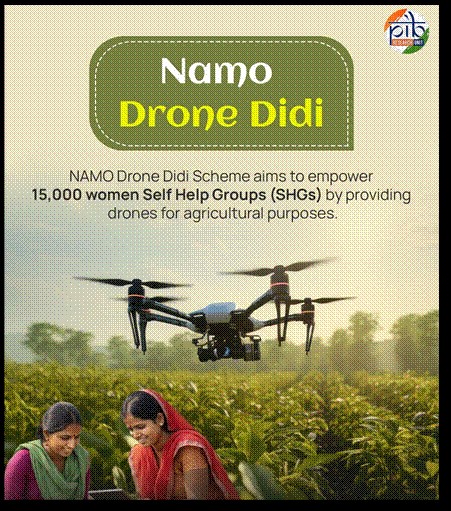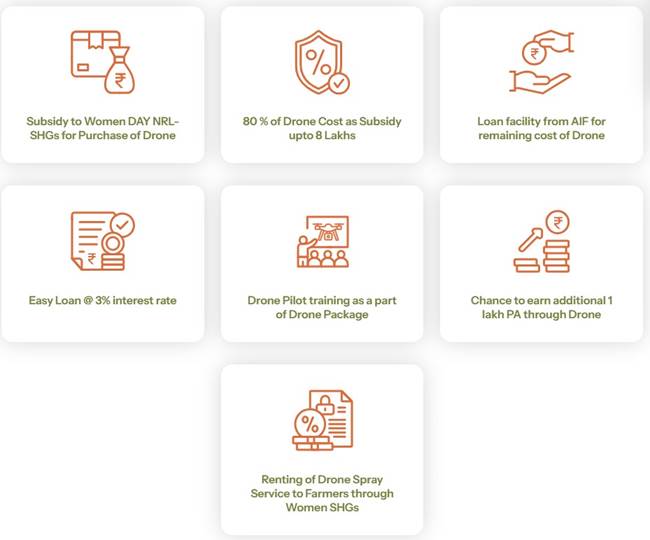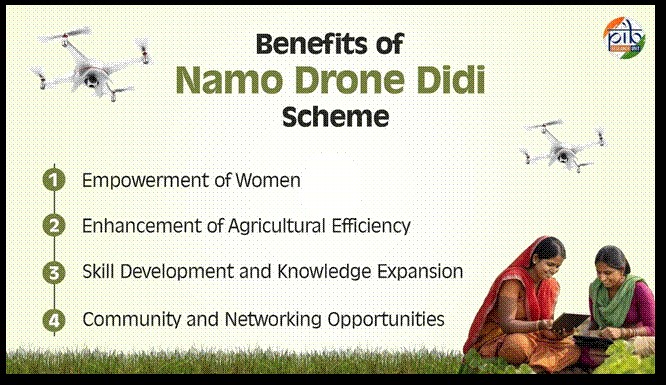Empowering Women Self-Help Groups with Advanced Agricultural Technology
Posted On: 04 NOV 2024 3:40PM
Namo Drone Didi is a central sector scheme aiming to empower women-led Self-Help Groups (SHGs) by equipping them with drone technology to provide agricultural services. The scheme aims to provide drones to 15000 selected Women SHGs during the period from 2024-25 to 2025-2026 for providing rental services to farmers for agriculture purpose (application of liquid fertilizers and pesticides for the present). This initiative is expected to generate an additional income of at least Rs. 1 lakh per year for each SHG, contributing to economic empowerment and sustainable livelihood generation.

Key Features of Namo Drone Didi Scheme
The Namo Drone Didi Scheme has been meticulously designed to support women SHGs and help them grow. Here are some of its core elements:

- Financial Support and Accessibility
- Women SHGs receive substantial financial assistance, covering 80% of the drone and accessory costs, up to Rs. 8 lakhs. This support helps mitigate the high upfront expenses associated with drone technology.
- For the remaining 20% cost, SHGs can seek loans from the National Agriculture Infrastructure Financing Facility (AIF) with a 3% interest subvention.
- Collaborative Effort
- The scheme is a collaborative venture between the Department of Agriculture & Farmers Welfare, Department of Rural Development, and Department of Fertilizers, along with Lead
Fertilizer Companies (LFCs) and other supporting entities.
-
- The convergence of resources from these departments ensures effective resource allocation, demand-based deployment, and sustained support for SHGs in rural regions.
- Cluster-Based Implementation
- The implementation of the scheme hinges on rightful selection of the area/cluster and SHG groups in Rural Areas under DAY – NRLM where there is demand for drone to provide agriculture services. Thus, demand from the farmers based on certain commitment on their part for drone services will be evaluated for selection of the area/cluster which will then become the basis for selection of SHGs.
- Appropriate clusters where usage of Drones is economically feasible will be identified.
- Specialized Training for Women SHG Members
- One of the members of the women SHGs who is qualified will be selected for 15-day training comprising of 5-day mandatory drone pilot training and additional 10 days training for agriculture purpose for nutrient and pesticide application.
- The other member/ family member of the SHG under DAY – NRLM with inclination to take up repairs of electrical goods, fitting and mechanical works will be trained as drone assistant.
- Infrastructure and Support from LFCs
- LFCs play a crucial role by bridging the gap between SHGs and drone manufacturing companies, helping SHGs with procurement, repair, and maintenance of drones. Additionally, they promote the use of nano fertilizers with the drones, enhancing efficiency in agricultural practices.
Benefits of the Namo Drone Didi Scheme
- Empowerment of Women
- The scheme provides specialized training in drone technology, equipping women with advanced skills that are increasingly valuable in modern agriculture. This knowledge enables them to perform tasks like crop monitoring, soil analysis, and precision farming more efficiently.
- Enhancement of Agricultural Efficiency
- Drone technology significantly enhances the precise application of pesticides and fertilizers, transforming traditional agricultural practices. Equipped with advanced GPS and sensor
technology, drones can be programmed to follow precise flight paths over fields, ensuring even and targeted application. This precision reduces the overuse of chemicals, minimizing environmental impact and lowering costs for farmers.
- Skill Development and Knowledge Expansion
- The scheme provides specialized training in drone technology, enabling women to acquire advanced skills in modern agricultural practices such as applying fertilizers, pesticides, and herbicides accurately, ensuring even distribution and optimal usage. Soil and field analysis is streamlined with drones, enabling detailed surveys and fertility assessments. Women can also enhance irrigation management by identifying areas needing more or less water, detecting leaks, and managing water resources efficiently.
- Community and Networking Opportunities
- Women can connect with a supportive network of fellow participants, fostering a sense of community and collaboration. They have the chance to join forums and workshops where they can share experiences, challenges, and best practices, enhancing their collective knowledge and skills. The scheme also provides access to industry experts, mentors, and agricultural professionals, creating avenues for mentorship and professional growth.

Operational Guidelines and Monitoring
The scheme’s operational framework is supported by robust governance mechanisms. The scheme will be overseen by an Empowered Committee of Secretaries from key departments like Agriculture, Rural Development, Fertilizers, Civil Aviation, and Women and Child Development, ensuring comprehensive governance. An Implementation and Monitoring Committee, led by the Additional Secretary of the Department of Rural Development, will guide and supervise the technical and operational rollout. The scheme provides SHGs with a fully equipped drone package, which includes spray assembly, a carrying box, batteries, a fast charger, and accessories such as a pH meter and anemometer, all covered by a one-year warranty, two years of annual maintenance, and comprehensive insurance. Additionally, a 15-day training program will equip two SHG members with essential skills: one will undergo drone pilot training, while the other will receive training in maintenance, ensuring sustainability. State Departments will strategically select SHGs based on agricultural demand, with each SHG expected to manage around 2,000–2,500 acres annually, supported by close monitoring and guidance. Furthermore, the Drone Portal, an IT-based MIS, will provide real-time monitoring, managing service delivery, fund disbursement, and drone operation tracking to ensure the scheme's smooth execution and effectiveness.
Conclusion
Through the Namo Drone Didi scheme, the Government of India is taking a significant step towards advancing agricultural practices while empowering women in rural areas. This initiative aligns with the government’s broader goals of promoting women-led development and infusing technology into traditional sectors like agriculture. The scheme promises to revolutionize farming practices, provide a sustainable income source for SHGs, and inspire a new generation of women entrepreneurs in rural India.
References:https://static.pib.gov.in/WriteReadData/specificdocs/documents/2024/aug/doc2024821378701.pdf https://pib.gov.in/PressReleasePage.aspx?PRID=2070029
https://namodronedidi.php-staging.com/about-scheme https://sansad.in/ls/search
Namo Drone Didi
******
Santosh Kumar/ Ritu Kataria /Madiha Iqbal
(Backgrounder ID: 153383)
Provide suggestions / comments